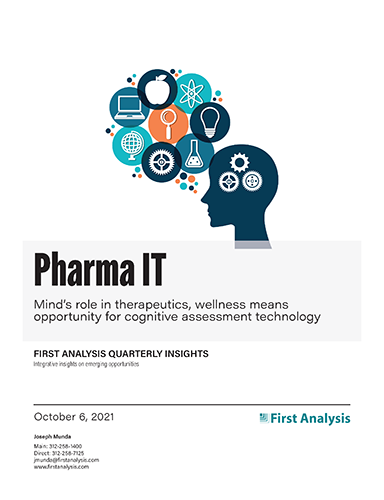Quarterly insights: Pharma IT
Mind’s role in therapeutics, wellness means opportunity for cognitive assessment technology

The increasing burden and costs associated with Alzheimer’s disease and other neurodegenerative diseases have made early diagnosis and intervention a national priority. However, conducting clinical trials to develop therapies for diseases like Alzheimer’s is particularly challenging, contributing to higher costs than for many other conditions. Cognitive assessment technology is an important solution to this challenge.
Applications for cognitive assessment technology extend beyond neurodegenerative diseases. Trial sponsors, regulators and physicians are increasingly interested in measuring and monitoring cognitive function during the drug development process to assess safety and risk for a broad spectrum of drugs. We think digital cognitive assessments, which trial sponsors have recently adopted out of necessity (often due to the pandemic) will continue to grow in popularity.
We highlight some of the companies providing cognitive assessment technology to trial sponsors for a variety of applications. Their capacity to improve understanding of cognition in healthcare offers enormous promise for technology providers, pharmaceutical companies, and quality of life.
TABLE OF CONTENTS
Includes discussion of Cogstate (ASX: CGS), Cambridge Cognition (AIM: COG), WCG Clinical (WCGC) and seven private companies
- Alzheimer’s and other neurodegenerative diseases dominate the cognitive health challenge
- Beyond hardware and chemistry: Key role for cognitive assessments in the neurodegenerative challenge
- Compelling case for cognitive assessments in drug development
- Aduhelm Alzheimer’s approval a vanguard of widening opportunity for cognitive assessments
- Opportunity for cognitive assessment technology beyond Alzheimer’s
- Rich opportunity for cognitive assessment technology providers and society as a whole
- eClinical index return far ahead of Nasdaq, S&P 500; commercialization index lags all
- Pharma IT M&A activity for Q2 and Q3 within two-year range
- Pharma IT private placements slow in Q2, Q3
Alzheimer’s and other neurodegenerative diseases dominate the cognitive health challenge
Cognition is defined as the mental action or process of acquiring knowledge and understanding through thought, experience and the senses. It involves various brain functions and processes such as knowledge, attention, memory, language, reasoning, judgement, comprehension, decision making and visuospatial function. Cognitive impairment refers to persistent deficits in the brain’s ability to function effectively. Cognitive impairment can have significant impact not only on the daily lives of patients but also their families. Depending on severity, signs of cognitive impairment, such as memory loss, confusion and difficulties carrying out routine day-to-day tasks, can be pronounced or subtle. Cognitive impairment is associated most notably with neurodegenerative diseases such as Parkinson’s disease, amyotrophic lateral sclerosis, Huntington’s disease and Alzheimer’s disease.
Alzheimer’s, the most common neurodegenerative disease, is a progressive brain disorder that slowly destroys memory and thinking skills, and eventually the ability to carry out simple tasks. According to statistics from the Alzheimer’s Association, an estimated 6.2 million Americans age 65 and older are currently living with Alzheimer’s. In addition to being the sixth-leading cause of death in the United States, it is costly. The current total national cost of caring for patients with Alzheimer’s other dementias is about $355 billion annually, not including an estimated $257 billion in unpaid caregiving. Without progress, the number of patients suffering from Alzheimer’s is expected to double to about 13 million by 2050, with annual costs projected to eclipse $1 trillion.

Request full report
To access the full report, please provide your contact information in the form below. Thank you for your interest in First Analysis research.
